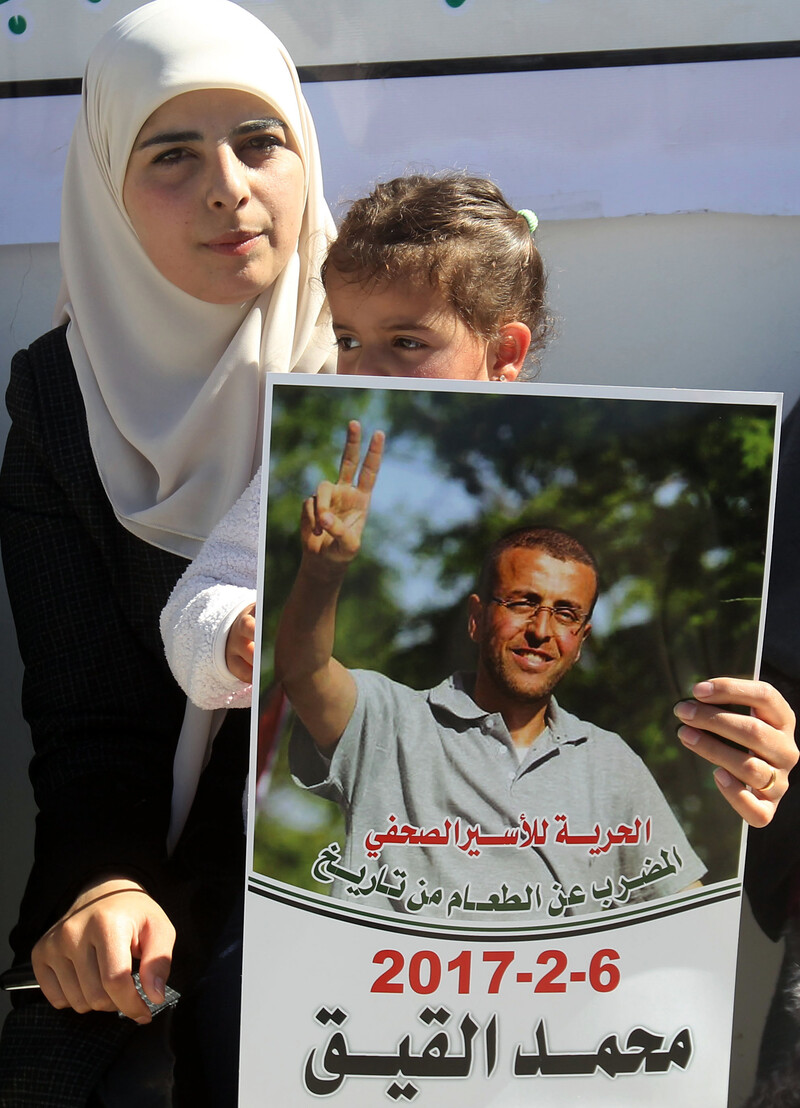Rights and Accountability 2 March 2017

Fayha Shalash, the wife of Muhammad al-Qiq, displays a poster of her husband during a demonstration in support of Palestinian prisoners in the West Bank city of Hebron, 20 February.
APA imagesPalestinian hunger striker Muhammad al-Qiq can no longer walk after refusing food for three weeks in protest of his detention by Israel without charge or trial.
The 35-year-old journalist’s health sharply deteriorated last week and he was transferred to a prison clinic on 22 February. Al-Qiq is showing signs that he may suffer vision loss, according to his lawyer.
Israeli prison authorities have started pressuring al-Qiq to undergo medical checks, which he has refused as part of his protest, the lawyer told media.
An Israeli military court judge upheld the three-month administrative detention order against al-Qiq, a reporter for the Saudi news agency al-Majd, on Tuesday.
“Today’s decision to approve the administrative detention of Muhammed al-Qiq is an affront to justice. Israel’s administrative detention which is predominately used to detain Palestinians without charge or trial is arbitrary and abusive,” Amnesty International stated that same day.
Al-Qiq was most recently arrested in January, less than a year after he won his release from prison following a 94-day hunger strike in protest of being held under administrative detention.
Reporter freed, more detained
The deterioration of his health came as another Palestinian journalist, Omar Nazzal, was released after Israel detained him for 10 months without charge or trial.
Nazzal, freed on 20 February, was held under an administrative detention order issued by a military court. The order was renewed three times since his arrest last April while he was attempting to leave the occupied West Bank to attend a journalism convention in Bosnia.
Over a dozen more Palestinian journalists and media workers remain behind Israeli bars. Some are being held without charge or trial, like al-Qiq, and others have been hit with incitement charges related to their work.
Four journalists with the al-Sanabel radio station in Dura, near the West Bank city of Hebron, arrested in an Israeli military raid last August are among those facing incitement charges.
The Israeli military accuses the radio station of broadcasting songs like “Dura the Mighty” and calling for “harming” Israeli soldiers on air and on its Facebook page.
The previous month before the August arrest raid, soldiers shot and injured two youths from Dura while laying siege to the surrounding area.
The military’s indictment states that Nidal Amro, one of the accused journalists, reported the location of Israeli soldiers during a live broadcast during an army operation that took place about a week after the siege.
Another al-Sanabel journalist, Muntasir Nassar, is alleged to have aired a tribute to Muhammad al-Faqih the day after the wanted Palestinian man was crushed to death by Israeli forces who were attempting to arrest him.
“God have mercy on your soul and may God help you to be accepted to the eternal heaven, oh hero,” the indictment quotes Nassar as saying on air.
Journalists held without charge
Hassan Safadi, a media coordinator for the prisoners rights group Addameer and a journalist, is also being held under administrative detention.
Safadi was arrested last May while he was returning from a conference in Tunisia.
A resident of Jerusalem, Safadi was taken to a detention center in the city where he was interrogated for 40 days and subjected to sleep deprivation, stress positions and poor nourishment.
A Jerusalem court ordered his release in June, but Israeli defense minister Avigdor Lieberman signed an administrative detention order against Safadi the day he was due to be released.
In December, Safadi was handed down another six-month detention order.
Osama Shaheen, a reporter and head of the Palestinian Prisoners’ Center for Studies, is being held under administrative detention. Shaheen was summoned for interrogation by Palestinian intelligence before his arrest by Israel on 1 September.
Last month, journalist Hamam Hantash was also ordered held under under administrative detention.
Earlier this month, the Palestinian Center for Development and Media Freedoms (MADA), a group that monitors press freedom in the West Bank and Gaza Strip, released its annual report on press violations for 2016.
Fewer press violations were committed by Israel last year than in 2015, which saw a surge in abuses as a result of increased confrontations between Israeli forces and Palestinians in the West Bank.
Despite the decline, the monitoring group stated that Israel continues to shut down media outlets, imprison journalists and pressure social media companies to restrict political speech.
Noam Rotem contributed research.






Comments
Covered any of these arrested journalists?
Permalink sharonsj replied on
Feb. 15, 2016: Palestinian Authority security forces on Monday detained journalist Ehab Al-Jariri, who complained that Palestine TV had paid a monthly salary of $12,000 to a female hairdresser. Al-Jariri, who hosts a talk show on a Ramallah-based radio station, referred to the case during a program on the misuse of public funds.
Jan. 5, 2016: Hamas security forces on Sunday detained Palestinian journalist and satirist Ayman Al-Aloul in the Gaza Strip, his wife told Ma’an.
Nov. 2015: The PA ordered the closure of a newspaper office in Ramallah and the detention of a female journalist, Naela Khalil. The announcement also coincides with the PA's ongoing crackdown on freedom of expression in the West Bank, where Palestinians are being arrested for posting critical remarks on social media.
Oct. 18, 2014: Palestinian Authority security forces detained two journalists on Friday who were on assignment covering an anti-Israel protest in Nablus.